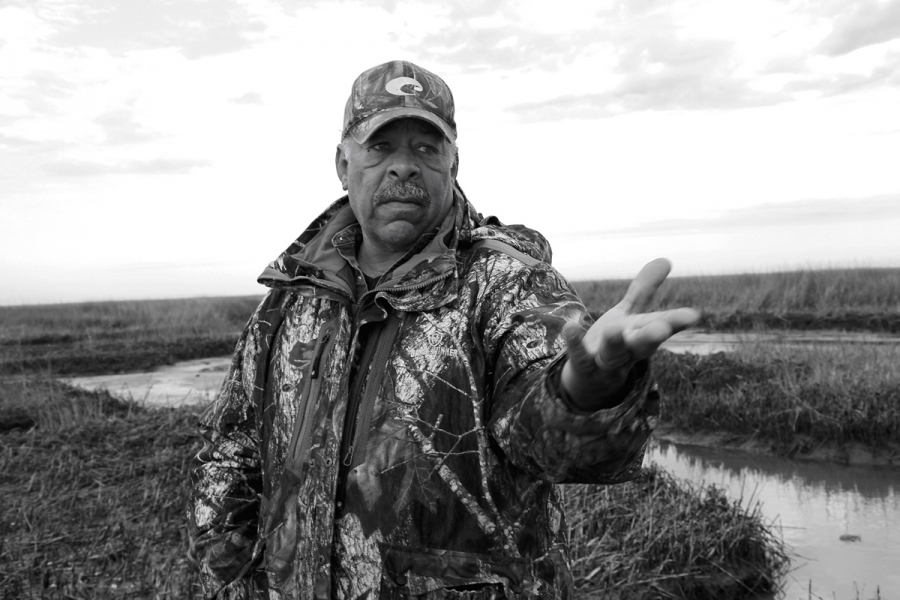
Louisiana, Purchased
In ways both overt and less obvious, many minority and low income communities in Louisiana have been compromised to the point of extinction. Today, wetlands loss, environmental degradation, and serious health issues directly attributable to chemical pollution continue to affect these populations disproportionately.
One of these communities, Mossville, really is on the verge of extinction. Founded in 1790 by a freed slave, Mossville evolved into a thriving and self-sustaining settlement that allowed residents to live free of racism during the long Jim Crow period. This utopia lasted until the petrochemical industry established a stronghold in Calcaseiu Parish in which Mossville resides. For decades, the health of Mossville residents has been compromised due to the close proximity of fourteen petrochemical companies, some of which began operations in the 1930s. Abnormal cancer rates, respiratory illnesses and reproductive disorders have all been scientifically linked to chemical releases routinely engaged by these plants.
For more than two decades, I have explored the ways in which this kind of class and racial discrimination is woven into our national cultural fabric, by photographing various supremacist organizations and those others who are the recipients of their actions. For the past four years I have photographed exclusively in Louisiana, examining the ways in which our collective demand for petroleum products jeopardizes the health of both the residents and the terrain of Louisiana. In many instances, the populations most affected are people of color.
-
 Area 3, Mossville
Area 3, Mossville
Area 3, Mossville
Area 3, Mossville
-
 Bayou Isle de Jean Charles.
Bayou Isle de Jean Charles.
Bayou Isle de Jean Charles.
Bayou Isle de Jean Charles.
-
 Braydon
Braydon
Braydon
Braydon
-
 Burn over Isle de Jeans Charles
Burn over Isle de Jeans Charles
Burn over Isle de Jeans Charles
Burn over Isle de Jeans Charles
-
 Hunting Gators Near Delacroix
Hunting Gators Near Delacroix
Hunting Gators Near Delacroix
Hunting Gators Near Delacroix
-
 Jade and the Gators
Jade and the Gators
Jade and the Gators
Jade and the Gators
-
 Maurice and His Destroyed Oyster Beds
Maurice and His Destroyed Oyster Beds
Maurice and His Destroyed Oyster Beds
Maurice and His Destroyed Oyster Beds
-
 Moving Crabtraps. Tropical Storm Lee.
Moving Crabtraps. Tropical Storm Lee.
Moving Crabtraps. Tropical Storm Lee.
Moving Crabtraps. Tropical Storm Lee.
-
 Near Delacroix
Near Delacroix
Near Delacroix
Near Delacroix
-
 Near Pointe au Chien
Near Pointe au Chien
Near Pointe au Chien
Near Pointe au Chien
-
 Pageant Contestants, Orange Festival Fort Jackson
Pageant Contestants, Orange Festival Fort Jackson
Pageant Contestants, Orange Festival Fort Jackson
Pageant Contestants, Orange Festival Fort Jackson
-
 Paris Road Chalmette
Paris Road Chalmette
Paris Road Chalmette
Paris Road Chalmette
-
 School Bus, Norco
School Bus, Norco
School Bus, Norco
School Bus, Norco
-
 Stacey Ryan, Mossville, LA
Stacey Ryan, Mossville, LA
Stacey Ryan, Mossville, LA
Stacey Ryan, Mossville, LA
-
 Sunshine River Bridge and Refinery
Sunshine River Bridge and Refinery
Sunshine River Bridge and Refinery
Sunshine River Bridge and Refinery
-
 Sunshine River Bridge
Sunshine River Bridge
Sunshine River Bridge
Sunshine River Bridge
-
 Thawing the Shark Head
Thawing the Shark Head
Thawing the Shark Head
Thawing the Shark Head
-
 Wayde's Crabs Near Montegut
Wayde's Crabs Near Montegut
Wayde's Crabs Near Montegut
Wayde's Crabs Near Montegut
https://main.oxfordamerican.org/item/370-photo-essay-louisiana-purchased#sigProIdffa69e1586
Terri Garland is currently working on a film, Louisiana, Purchased. This film examines the history of community dissolution and relocation beginning with the 1830 Indian Removal Act up to present day corporate buyouts. These stills capture some of the most vivid moments of the film. Through interviews with community activists and tribal elders, the film will give voice to those who struggle for justice in the face of a government who has long favored the interests of big business over the welfare of constituents. Her still images are sponsored by Blue Earth Alliance, and she is currently funding her movie via Hatchfund. Support the film here.


